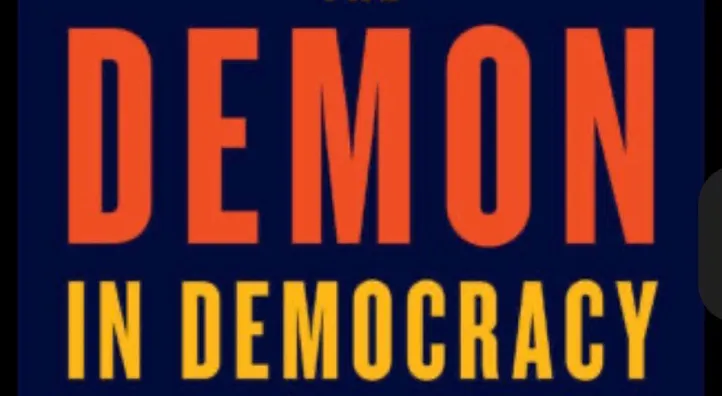The Culling of Man, pt. three
The United States of America was established as a Constitutional Republic in 1776, a foundation that endures today. While it incorporates democratic aspects, such as citizens electing representatives, ensuring free and fair elections, protecting individual rights, and holding the government accountable to the people, it is not a pure democratic republic. Recent years have made this distinction even more apparent. Most importantly, it stands apart from being a social democracy, often seen as a precursor to a totalitarian state.
Those who insist that the U.S. is a democracy may lack a deep understanding of politics and governance, unintentionally pushing toward a state dominated by authority. They may not have fully matured into responsible adults and seem content with a life devoid of responsibility, believing it benefits others when, in reality, they primarily pursue their self-interest. They have yet to achieve an enlightened sense of self-interest.
The delicate balance between adapting to society and asserting oneself must be continuously redefined. Throughout life, individuals engage in an ongoing internal struggle involving ego formation, compliance, originality, dependence, and independence. Democracy implies the freedom to develop oneself and avoid being shaped by external forces, but this freedom comes with the duty to contribute energy and attention to others' development.
Democracy isn't solely rooted in the personal rights of the ordinary person but, even more so, in their interests and responsibilities. Disengagement from politics and governance can inadvertently lead to power-driven politics.
In psychoanalytic treatment, individuals eventually face a crucial decision: embracing adulthood. They have gained self-awareness, yet breaking free from the comforting fantasies, hero worship, and idealized endings of childhood proves challenging. Some may seek refuge in parental authority, akin to adolescents, rather than becoming mature, responsible participants in a democratic society.
Like infants seeking solace in thoughtless security, some may long for the government or a state figure to solve their problems. This attitude fosters authoritarianism and conformity, allowing prejudice and ignorance to seize control.
Democracy appeals to the adult aspects of human nature, whereas fascism and totalitarianism tempt infantile desires. When individuals accept self-chosen responsibility and gain a deeper understanding of their inner motivations, their perception of the world matures, free from immature yearnings. They can function as mature adults, where freedom intertwines with self-control, no longer relying on external authorities.
Actual development lies in building our personality, conscious ego, and superego. It should not be enforced but achieved through the voluntary acceptance or rejection of existing moral values. Only when the inner moral compass is robust can one act on their own ethical principles, living not only for self-interest but for the greater good, reaching a state of enlightened self-interest.
Enlightened self-interest is the ability to act in your interests from self-acceptance and confidence while also taking into account the interests of others. The principle of enlightened self-interest has two parts: To cope with stress and achieve happiness, you need to place your own interests first, and your own interests will be best served if you consider other people's interests.
While 'selfishness' is natural, we try to deny its existence in ourselves because we are also strongly motivated by generous feelings, and selfishness doesn’t always feel right and is perceived as dangerous to society. Altruism represents social interest—the wish to ensure the social system survives and develops.
It appears that social interest, like self-interest, is also inherent within human beings, but how is that? How is it that two contradictory tendencies can co-exist?
We help others to help ourselves. In other words, our self-interest is enlightened.
Clearly, self-interest, without a duty to social interest, is misguided. However, the same is valid with social interest without self-interest. Always putting others first leads to resentment or a martyr attitude. People who believe they are acting purely in the interests of others are also dangerous. Such individuals may justify all forms of manipulative and controlling behavior toward others by denying (to themselves) that their own self-interest is involved.
You will feel less guilty about looking after yourself once you recognize that self-interest is inherent. You will be more likely to cooperate with others if you recognize that altruistic behavior is in your interest and if you are able to modify any personal tendencies that prevent you from effectively relating with others. Everyone benefits when you accomplish both.
Therefore, until enlightened self-interest becomes part of you, consciously strive to achieve more of what you desire while respecting the views and feelings of others.
© WaKeUpWoRLD
Those who insist that the U.S. is a democracy may lack a deep understanding of politics and governance, unintentionally pushing toward a state dominated by authority. They may not have fully matured into responsible adults and seem content with a life devoid of responsibility, believing it benefits others when, in reality, they primarily pursue their self-interest. They have yet to achieve an enlightened sense of self-interest.
The delicate balance between adapting to society and asserting oneself must be continuously redefined. Throughout life, individuals engage in an ongoing internal struggle involving ego formation, compliance, originality, dependence, and independence. Democracy implies the freedom to develop oneself and avoid being shaped by external forces, but this freedom comes with the duty to contribute energy and attention to others' development.
Democracy isn't solely rooted in the personal rights of the ordinary person but, even more so, in their interests and responsibilities. Disengagement from politics and governance can inadvertently lead to power-driven politics.
In psychoanalytic treatment, individuals eventually face a crucial decision: embracing adulthood. They have gained self-awareness, yet breaking free from the comforting fantasies, hero worship, and idealized endings of childhood proves challenging. Some may seek refuge in parental authority, akin to adolescents, rather than becoming mature, responsible participants in a democratic society.
Like infants seeking solace in thoughtless security, some may long for the government or a state figure to solve their problems. This attitude fosters authoritarianism and conformity, allowing prejudice and ignorance to seize control.
Democracy appeals to the adult aspects of human nature, whereas fascism and totalitarianism tempt infantile desires. When individuals accept self-chosen responsibility and gain a deeper understanding of their inner motivations, their perception of the world matures, free from immature yearnings. They can function as mature adults, where freedom intertwines with self-control, no longer relying on external authorities.
Actual development lies in building our personality, conscious ego, and superego. It should not be enforced but achieved through the voluntary acceptance or rejection of existing moral values. Only when the inner moral compass is robust can one act on their own ethical principles, living not only for self-interest but for the greater good, reaching a state of enlightened self-interest.
Enlightened self-interest is the ability to act in your interests from self-acceptance and confidence while also taking into account the interests of others. The principle of enlightened self-interest has two parts: To cope with stress and achieve happiness, you need to place your own interests first, and your own interests will be best served if you consider other people's interests.
While 'selfishness' is natural, we try to deny its existence in ourselves because we are also strongly motivated by generous feelings, and selfishness doesn’t always feel right and is perceived as dangerous to society. Altruism represents social interest—the wish to ensure the social system survives and develops.
It appears that social interest, like self-interest, is also inherent within human beings, but how is that? How is it that two contradictory tendencies can co-exist?
We help others to help ourselves. In other words, our self-interest is enlightened.
Clearly, self-interest, without a duty to social interest, is misguided. However, the same is valid with social interest without self-interest. Always putting others first leads to resentment or a martyr attitude. People who believe they are acting purely in the interests of others are also dangerous. Such individuals may justify all forms of manipulative and controlling behavior toward others by denying (to themselves) that their own self-interest is involved.
You will feel less guilty about looking after yourself once you recognize that self-interest is inherent. You will be more likely to cooperate with others if you recognize that altruistic behavior is in your interest and if you are able to modify any personal tendencies that prevent you from effectively relating with others. Everyone benefits when you accomplish both.
Therefore, until enlightened self-interest becomes part of you, consciously strive to achieve more of what you desire while respecting the views and feelings of others.
© WaKeUpWoRLD




